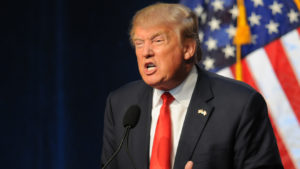I was under the impression that we all agreed that government officials should do everything to eliminate both the reality and the appearance of acting for financial gain before, during, and after serving as a public figure.
 Apparently, that was naïve of me, as President-elect Trump has signalled his plan to turn over his business to his children, with details to follow in January 2017.
Apparently, that was naïve of me, as President-elect Trump has signalled his plan to turn over his business to his children, with details to follow in January 2017.
Wall Street Journal columnist Holman Jenkins wrote recently that any President is “always conflicted,” and therefore maybe President Elect Trump should be cut some slack with respect to his and his family’s business interests.
As Trump declines to fully separate himself from the family business, “Why not widen our tolerance a bit?” asks Jenkins. “Why not allow that Americans have the right to pick a business owner as President? Let’s see how their choice plays out.”
No, let’s not. People who make public policy should not have a private financial stake in the outcome, or even the appearance of a stake in the outcome. Shifting the Trump businesses to his children does not solve this problem. Even if the Trump family members aren’t seeking to profit from government ties, both critics and favor-seekers will assume that’s the case. That assumption itself undermines basic good government.
I understand Trump supporters view his business success as a kind of protection against financial corruption. After all, he and his children don’t need the money. Personally, I like the idea of a wealthy businessperson in office who therefore should be “immune” to financial temptation.
But that’s not even the point. People will still assume that policy isn’t made with the public’s interest foremost in mind. His critics will assume everyone’s on the take. Allies and favor-seekers will attempt to gain an advantage however they can. Is that great hotel site with water views in Costa Rica worth $50 million? Maybe selling to the Trump children for just $40 million gets an important meeting set up. Revisiting Dodd-Frank banking regulation soon? I’m happy to review those financing terms for you, Mr. Trump, Jr.
What real estate seller anywhere in the world wouldn’t want to cut them a good deal? What bank wouldn’t offer preferential terms?

The widespread idea that people get rich off of public service is an insidious termite nest, eating at and hollowing out the foundations of a republic. Successful generals in the late Roman republic generated extraordinary, corrupting wealth through their public offices. Latin American governments and Putin’s Russia offer past and current examples of the corrupt practices and cynicism it engenders about government. This is not a “Let’s see how their choice plays out” situation. We already know how it plays out.
Different moral codes
Jane Jacobs in Systems of Survival: A Dialogue on the Moral Foundations of Commerce and Politics argued that a completely different set of moral codes defines how people in government should act versus how people in private enterprise should act. The two moral codes are each valid, and each work independently and properly in parallel, when contained within their own system. The blending of the two moral systems, however, leads to criminal outcomes and a breakdown of trust in society.
I read this about 20 years ago and haven’t seen a better explanation since.
The partial list of the proper moral codes of government workers – and here you could picture the police and military, plus political campaigners and government office holders – include the following precepts: Shun Trading, Be Obedient and Disciplined, Adhere to Tradition, Respect Hierarchy, Be Loyal, Take Vengeance, Dispense Largess, Be Exclusive, Show Fortitude, and Treasure Honor. Those moral codes make me picture an impressive old county courthouse, commanding a bit of awe. In a government and public service context, these moral precepts work best.
A partial list of the proper moral actions of business people – and here you could picture a trading firm, a technology startup, or a busy coffee shop – include the following codes: Shun Force, Collaborate Easily with Strangers, Compete, Use Initiative and Enterprise, Be Open to Inventiveness and Novelty, Be Efficient, Be Thrifty, Dissent for the Sake of the Task. I’m picturing an open floorplan marketing company with comic-book colored walls, glass conference rooms, and the smell of caffeine. In a business context, these moral values work best.
The point is not which code of conduct is morally superior, but rather that each code is consistent and appropriate to the job at hand.

The problem, Jacobs explained, is when you mix the two moral codes. The mixing leads to monstrosities. The Mafia, for example, is a for-profit business enterprise which employs moral codes from the government side, like loyalty, largesse, honor, and vengeance. Government office holders, on the other side, slip into corruption when they adopt values like of profit-seeking, inventiveness, and enterprise. Private armies and mercenaries are a special kind of mixed moral-code monstrosity, as is anytime we see politicians engaging in clear pay-to-play practices. What is moral and good in one context is not moral and good in the other.
Democrats too
By no means does one party have a cleaner history than the other on this. According to biographer Robert Caro, Lyndon Johnson built an ill-gotten fortune through pressuring businesses in Texas to advertise with radio stations nominally “owned” by Lady Bird Johnson, while Johnson served in Congress and the Senate. Technically (technically!) they weren’t his, but come on, “entrepreneurial activity” in this context is obviously wrong. Al Gore reportedly left the Vice Presidency in 2000 with a $1.7 million net worth, which then grew to an estimated $200 million net worth by 2012 through media, technology, and solar investments. I have a hard time believing his business partners solely valued him for his business acumen, rather than his government experience. The $240 million in income reportedly earned by the Clintons in their post White House careers also disgust me. They mixed the separate moral codes of business and government in a monstrous way, and they unfortunately set the stage for Trump to blow off calls to fully separate himself from his family’s businesses.
The point should not be “forget it, because both sides do this.” The point is, we should not be ok with the mixing of profit and public service, nor even the appearance of it. People will assume it’s happening with Trump’s family. We can’t do what Jenkins suggests, and normalize it, accept it, and “see how their choice plays out.”
Accepting this kind of moral monstrosity moves the republic much close to the Russian and Latin American model, and that’s not a good thing.
Please see related posts:
Curt Schilling and Rhode Island – The Moral Monstrosity of “Economic Development Politicies”
Book Review: The Death and Life of Great American Cities, by Jane Jacobs
Book Review: Cities And The Wealth of Nations by Jane Jacobs
Trump – Why I Can’t Sleep At Night
Post read (187) times.





